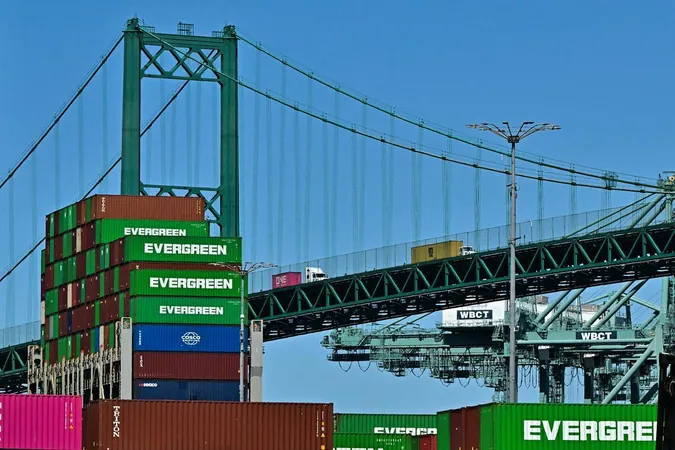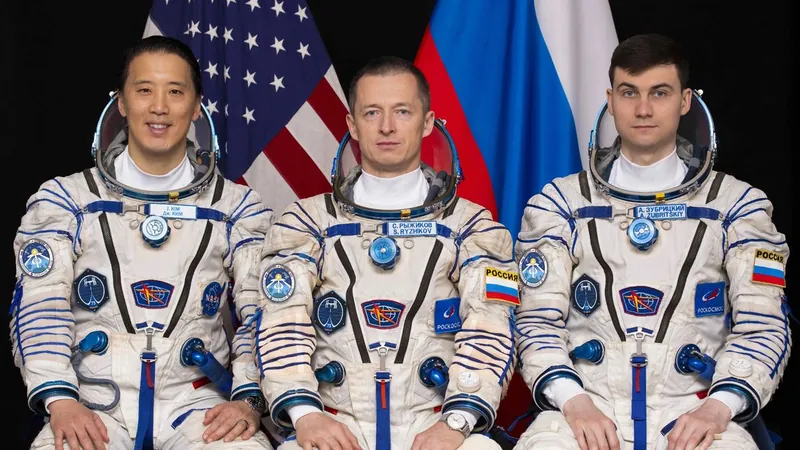
Global Leaders Express Outrage Over Trump's New Tariffs: A Trade War on the Horizon?
2025-04-02
Author: Ming
In a bold move that sent shockwaves through international markets, U.S. President Donald Trump has announced a sweeping 10% baseline tariff on all imports to the United States, alongside significantly higher duties targeted at certain trading partners. This decision has elicited a fierce backlash from world leaders, who are voicing concerns over the potential ramifications on global trade.
Interestingly, Canada and Mexico, two of the U.S.'s largest trading partners, are exempt from Trump's new baseline tariff, although they still face steep tariffs of up to 25% on various goods related to border control and fentanyl trafficking, as clarified by the White House in their official communications.
Global Reactions: Leaders Speak Out
Canadian Prime Minister Mark Carney stated, “While some aspects of our trade relationship remain intact, we are committed to countering these tariffs decisively to protect our workforce and ensure Canada remains a strong player in the G7.”
The Brazilian government expressed deep disappointment, announcing it is considering all options to retaliate against this unilateral move, including appeals to the World Trade Organization. “Our focus is on protecting Brazilian exporters and ensuring fair trade practices,” said a spokesperson.
Australian Prime Minister Anthony Albanese emphasized that American consumers will ultimately bear the brunt of these tariffs. “We refuse to engage in a tit-for-tat escalation that leads to increased costs and stunted growth,” he declared.
South Korean Acting President Han Duck-soo warned that the onset of a global trade war necessitates a coordinated response. "Our government must utilize all resources to navigate this crisis effectively,” he urged.
New Zealand Trade Minister Todd McClay noted the importance of free trade, saying, “We will engage with the U.S. administration to assess the implications for our exporters and maintain our strong bilateral relations."
European leaders have not held back their criticism. Spanish Prime Minister Pedro Sanchez vowed to safeguard Spanish businesses against any adverse effects while Sweden Prime Minister Ulf Kristersson pleaded for a return to cooperation in trade, stating “We need to avoid a trade war that could derail economies on both sides.”
Swiss President Karin Keller-Sutter promised a swift response, stating, “Protecting our national interests and international trade laws remains a top priority, and we will assess our next steps promptly.”
Notably, Irish Prime Minister Micheal Martin expressed sorrow over the 20% tariffs imposed on imports from the European Union, reiterating his belief that tariffs are detrimental to all involved.
In Italy, Prime Minister Giorgia Meloni reiterated her commitment to negotiating with the U.S. to prevent a trade conflict that could undermine Western economies in the face of rising global competition.
Manfred Weber, President of the European People's Party and a prominent voice in the European Parliament, expressed discontent, stating, “Today is not a day of liberation but one of resentment. We stand united to defend our interests and advocate for fair dialogues.”
Colombian Foreign Minister Laura Sarabia also highlighted her government's focus on protecting national industry and exporters in light of these developments.
As the dust settles on Trump's announcement, the world watches closely. An increasingly interconnected global economy stands at a critical juncture where these tariffs could lead to retaliatory measures, potentially sparking a full-fledged trade war. Will nations unite to push back against these economic measures, or is this just the beginning of a new era in international trade tensions? Stay tuned for more updates as this story unfolds!




 Brasil (PT)
Brasil (PT)
 Canada (EN)
Canada (EN)
 Chile (ES)
Chile (ES)
 Česko (CS)
Česko (CS)
 대한민국 (KO)
대한민국 (KO)
 España (ES)
España (ES)
 France (FR)
France (FR)
 Hong Kong (EN)
Hong Kong (EN)
 Italia (IT)
Italia (IT)
 日本 (JA)
日本 (JA)
 Magyarország (HU)
Magyarország (HU)
 Norge (NO)
Norge (NO)
 Polska (PL)
Polska (PL)
 Schweiz (DE)
Schweiz (DE)
 Singapore (EN)
Singapore (EN)
 Sverige (SV)
Sverige (SV)
 Suomi (FI)
Suomi (FI)
 Türkiye (TR)
Türkiye (TR)
 الإمارات العربية المتحدة (AR)
الإمارات العربية المتحدة (AR)